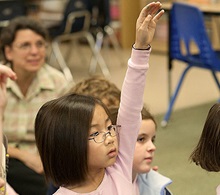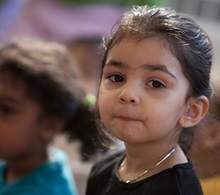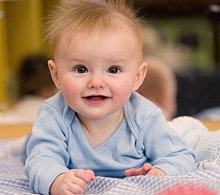 To assist you in finding the appropriate quality childcare, Premier has listed steps below that will guide you through finding a good daycare center and recognizing the signs of a good daycare center (See Part 1).
To assist you in finding the appropriate quality childcare, Premier has listed steps below that will guide you through finding a good daycare center and recognizing the signs of a good daycare center (See Part 1).
Signs of a good daycare center
- Reputation:
The references you talk to should be very happy with the daycare center. If they are unsure or have doubt, you probably will too. - Caring and qualified staff:
The staff should be enthusiastic and interact with the children in a positive way that shows they really care. The staff should have a philosophy about discipline, feeding and sleeping that follows your philosophy. The employees should be educated with at least two years of college, a background in child development, along with first aid training and knowledge of CPR. - Safe, clean facility:
A good daycare center has floors, walls, bathrooms, kitchen and changing stations that are clean, well lit, and ventilated. There should be established policies on how to keep things clean, when and how often hands are washed, and how to keep toys and equipment in safe working order. The daycare center should have an emergency plan, with first aid kits, fire extinguishers, and childproof storage areas. All general child safety issues should be followed. - Established rules and policies:
A good daycare center will be flexible but it should follow set hours, have enforced rules on sick children, and will require checkups and immunizations to prevent the spread of illness. The center should have an open door policy that allows you to stop for a visit unannounced. If they don’t have this policy, they might be hiding something. - A complete schedule of activities:
Good centers will have a schedule that allows for play time, quiet time, individual activities, meals, snacks, and group activities. One thing that should not be included in a good schedule is TV and videos. A good center teaches a wide variety of topics, while at the same time, teaching things appropriate for the age group. Also look for toys that are appropriate for the age of your child. These toys should be fun, while letting the child be imaginative and creative. - A current license:
While a license doesn’t guarantee the center will work for you, the center should be licensed by your local city services department. Also look and see if the center is accredited by the National Association for the Education of Young Children. Licensing laws vary from state to state.
Signs of a bad daycare center
- Reputation:
If you have heard bad word of mouth or the references make you question something, the daycare center is not for you. - An unqualified staff:
A staff that has no formal child training, no college education and no emergency training is not a staff you want around you child. If there are more than three or four children to each teacher, one might suspect the teachers could be overworked, underpaid, and potential not happy with their jobs. This situation could lead to high employee turnover that would not give your child the best daycare available. - Unsafe, dirty facility:
Do not use a daycare center whose facility is rundown, has bad lighting, dirty play or food preparation areas, toys and equipment in need of repair, or have dangerous items in reach of children. If the center has no emergency plan, is without first aid kits, fire extinguishers, and child proof storage areas, this are no place for your children. - No set rules:
A daycare center that has no policy with set rules is not the center for you. This will lead to confusion, misunderstandings, spread of illness, and a generally unsafe environment. - No daily schedule:
If the daycare center has no daily program of activities for your child, your child will not have a chance to learn and grow. Your child needs to be educated with stimulating, imaginative, and creative activities. If the center just lets the children play and watch TV, don’t use them. - Expired licenses:
If the center has an expired license or no license at all, don’t use them. This means they are either conducting business illegally or could not meet your local city services requirements to operate as a safe, quality center.
Premier offers quality childcare in Omaha, Nebraska. Our staff is here to help and will assist in making the right choices for the growth of your child!

 Choosing the proper daycare center for your child should be a carefully thought out and researched process. With some daycare centers being exceptional and some being just plain bad, it is important to pick a center that helps your child grow and develop his skills while also having fun.
Choosing the proper daycare center for your child should be a carefully thought out and researched process. With some daycare centers being exceptional and some being just plain bad, it is important to pick a center that helps your child grow and develop his skills while also having fun.  As we discussed in our last blog posting, selecting the right preschool can be a difficult decision. The next 3 Steps to selecting the right preschool in Omaha, Nebraska.
As we discussed in our last blog posting, selecting the right preschool can be a difficult decision. The next 3 Steps to selecting the right preschool in Omaha, Nebraska. Selecting the right preschool can be a difficult decision. Is your child ready, are you sending your child to the right school? These are common questions & Premier can help! 4 Steps to selecting the right preschool in Omaha, Nebraska.
Selecting the right preschool can be a difficult decision. Is your child ready, are you sending your child to the right school? These are common questions & Premier can help! 4 Steps to selecting the right preschool in Omaha, Nebraska. The Importance of Finding the Right Child Care for Your Infant
The Importance of Finding the Right Child Care for Your Infant